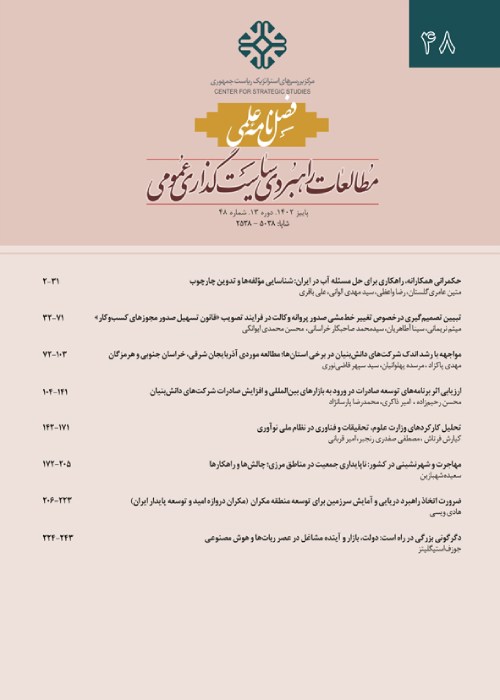Iran's foreign policy in the reformist administration towards European Union from a constructivist perspective
Abstract:
The mutual relations between Iran and Europe which results from their foreign policies، have witnessed many ups and downs after the Islamic Revolution. After victory of the Islamic Revolution، relations between Iran and Europe were strained and because of Europe''s all-out support from Iraq during the eight year war between Iran and Iraq the relations were at their lowest. After the imposed war، the «constructive administration» of Hashemi Rafsanjani tried to restore Iran''s foreign relations while reconstructing the widespread destructions caused by war. Within this framework، critical dialog with Europe started which was stopped after Mykonos incident and all European countries recalled their ambassadors from Iran. After the seventh presidential elections in 23 May 1997، Seyyed Mohammad Khatami was elected as the president of the Islamic Republic of Iran. The significant difference in the discourse of the new reformist administration in domestic and foreign affairs and taking new policies and strategies such as détente and trust building، coalition for peace and dialog among civilizations led to improved relations between Iran and European Union. This study tried to explore and analyze the reasons behind the relative success of the reformist administration in improving relations with the European Union. To this end، constructivist theory which emphasizes on concepts such as ideas، identity، discourse، inter- subjectivity beliefs، and social and spiritual constructs of international relations، was chosen as theoretical framework of the research. Based on the teachings of constructivist school، social and spiritual constructs of international relations played a more effective role in improving relations between Iran and Europe during the reformist administration. The reformist administration''s cultural، ethical and peaceful discourse which was based on interaction، dialog، mutual respect and toleration instead of conflict and war in international arena led to the formation of an inter- subjective belief and mutual understanding between Iran and Europe which resulted in their improved relations.
Keywords:
Language:
Persian
Published:
Journal Strategic Studies of Public Policy, Volume:6 Issue: 19, 2015
Pages:
40 to 92
magiran.com/p1439971
دانلود و مطالعه متن این مقاله با یکی از روشهای زیر امکان پذیر است:
اشتراک شخصی
با عضویت و پرداخت آنلاین حق اشتراک یکساله به مبلغ 1,390,000ريال میتوانید 70 عنوان مطلب دانلود کنید!
اشتراک سازمانی
به کتابخانه دانشگاه یا محل کار خود پیشنهاد کنید تا اشتراک سازمانی این پایگاه را برای دسترسی نامحدود همه کاربران به متن مطالب تهیه نمایند!
توجه!
- حق عضویت دریافتی صرف حمایت از نشریات عضو و نگهداری، تکمیل و توسعه مگیران میشود.
- پرداخت حق اشتراک و دانلود مقالات اجازه بازنشر آن در سایر رسانههای چاپی و دیجیتال را به کاربر نمیدهد.
In order to view content subscription is required
Personal subscription
Subscribe magiran.com for 70 € euros via PayPal and download 70 articles during a year.
Organization subscription
Please contact us to subscribe your university or library for unlimited access!



